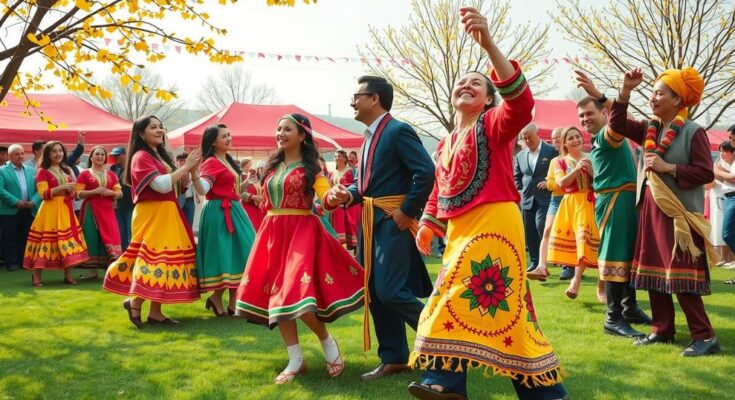The article explores the distrust among Kurds in Turkey regarding the peace process with the PKK amidst a crackdown on opposition. Abdullah Ocalan’s disbandment call offers hope, yet skepticism prevails due to ongoing military operations and past betrayals. Cultural events highlight resilience, yet many Kurds remain cautious, emphasizing the need for genuine reform and transparency from the government.
This article addresses the growing distrust among the Kurdish population in Turkey as the government remains silent on potential reforms following a prolonged conflict with the Kurdish militants. The peace process’s fragile status threatens not only stability in Turkey but also poses risks to socio-economic conditions in the southeastern regions. The death toll from the conflict exceeds 40,000, underscoring the urgency for a resolution.
Abdullah Ocalan, the jailed leader of the Kurdistan Workers Party (PKK), recently encouraged the group to disband, marking an important shift in the peace negotiations. The pro-Kurdish DEM Party, Parliament’s third-largest faction, has called for definitive democratization measures to follow Ocalan’s initiative. However, political leaders express skepticism regarding the government’s commitment to actual reform.
Interviews with Kurds reveal a prevailing sentiment of distrust regarding the peace process due to ongoing political crackdowns. Noteworthy is the arrest of Istanbul Mayor Ekrem Imamoglu, which has ignited significant protests, further complicating the political landscape. Influential figures within the Kurdish political realm worry that without effective measures, the peace process may falter.
Recent cultural events, such as the Newroz festival, observed an appreciation for Kurdish identity, with political discourse suggesting their inclusion in national narratives. Despite this, many Kurds feel disconnected from the state’s perceived advancements in rights and autonomy, frequently citing prior instances of betrayal during negotiations.
Against the backdrop of persisting military operations against the PKK, representatives from the group contend that Turkey’s actions contradict any claims of sincere efforts towards peace. They argue that substantial government concessions are necessary to progress meaningfully. In contrast, Turkish officials maintain that military operations will persist as long as the PKK poses a threat.
The historical context sheds light on the devastation faced by Kurdish communities, especially following escalated violence in 2016. Despite witnessing some policy changes under the Erdoğan administration, local leaders express uncertainty regarding future reforms. Public sentiment remains cautious, with many Kurdish citizens fearing repeated disillusionment.
Moreover, discussions surrounding a new constitution reflect the intricate balance Erdoğan must navigate while pursuing Kurdish support for potential electoral ambitions. Any perceived concessions could alienate nationalist sentiment among Turks, creating a complex dynamic in political discourse surrounding ethnic identity.
Despite prevailing tensions, glimpses of optimism exist as recent interactions between Erdoğan and Kurdish lawmakers hint at possible progressive dialogues. The government’s acknowledgment of Ocalan as a legitimate figure of peace could indicate a shift in the narrative surrounding the PKK and its leadership, though the exact implications remain unclear.
In conclusion, while there is a glimmer of potential for renewed dialogue and reform, the deep-seated distrust among Kurdish populations and the volatility of the peace process necessitate careful navigation. The prospects for a peaceful resolution depend heavily on the Turkish government’s willingness to commit to transparency and genuine engagement with Kurdish political aspirations.
In summary, the peace process between the Turkish government and Kurdish militants remains tenuous, overshadowed by distrust and political crackdowns. Abdullah Ocalan’s call for the disbandment of the PKK provides an opportunity for dialogue, though skepticism persists regarding governmental reforms. Cultural revitalization events like Newroz reflect the Kurdish community’s resilience, yet many remain apprehensive about the state’s commitment to equitable treatment. Moving forward, the success of the peace negotiations relies on genuine governmental initiatives and the careful management of nationalist sentiments.
Original Source: www.usnews.com




